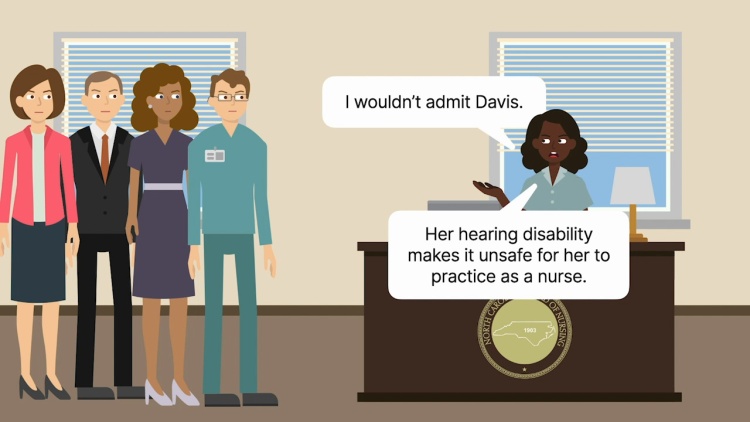Southeastern Community College v. Davis
United States Supreme Court
442 U.S. 397 (1979)

- Written by Josh Lee, JD
Facts
Davis (plaintiff) applied to an associate-degree nursing program at Southeastern Community College (the college) (defendant). Davis suffered from a serious hearing disability that prevented her from being able to understand normal speech. Davis had developed lip-reading skills. However, Davis was only able to understand speech if the speaker had gotten her attention, and she was looking directly at the speaker. The college discovered this disability and consulted with Mary McRee, the executive director of the North Carolina Board of Nursing. McRee advised that Davis’s disability would make it unsafe for Davis to practice as a nurse or participate safely in the normal clinical-training program, because Davis would be unable to respond to vocal commands from physicians in an operating room with surgical masks and in other scenarios. Based on McRee’s advice, the college determined that Davis was not qualified for the nursing program. Davis sued the college, alleging a violation of the Rehabilitation Act of 1973, as well as the Equal Protection and Due Process Clauses of the United States Constitution. The district court ruled in favor of the college after a bench trial. Davis appealed to the United States Court of Appeals for the Fourth Circuit, which reversed. The college then petitioned the United States Supreme Court for review. The Court granted certiorari.
Rule of Law
Issue
Holding and Reasoning (Powell, J.)
What to do next…
Here's why 907,000 law students have relied on our case briefs:
- Written by law professors and practitioners, not other law students. 47,100 briefs, keyed to 996 casebooks. Top-notch customer support.
- The right amount of information, includes the facts, issues, rule of law, holding and reasoning, and any concurrences and dissents.
- Access in your classes, works on your mobile and tablet. Massive library of related video lessons and high quality multiple-choice questions.
- Easy to use, uniform format for every case brief. Written in plain English, not in legalese. Our briefs summarize and simplify; they don’t just repeat the court’s language.





